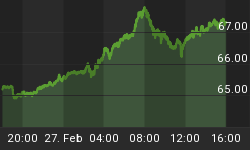I am often asked whether or not western governments are likely to confiscate gold, and my answer has invariably been on the lines of "unlikely at the moment, because so few people own gold". However given low stock levels in western vaults and that bail-ins are on the agenda the answer to the question should be reconsidered.
I first wrote about the new bail-in provisions after the Cyprus debacle last year. What it means for depositors is succinctly summarised in a current UK Government consultative document on the subject:
"Bail-in involves shareholders of a failing institution being divested of their shares, and creditors of the institution having their claims cancelled or reduced to the extent necessary to restore the institution to financial viability. The shares can then be transferred to affected creditors, as appropriate, to provide compensation."
On the face of it anyone with an unallocated gold account is at risk. In the past this risk has been dismissed, given that the Bank of England with or without the assistance of other central banks always bails out bullion banks in trouble. However, the ability of western central banks to bail out bullion banks in the future is compromised by the emptiness of their vaults, much of their gold being out on lease. Furthermore, because leased gold is still their legal property, they will have first call, leaving unallocated gold accounts with nothing.
This means that next time there is a market hiatus in gold bullion banks will probably be forced to renege on their gold obligations to customers, settling in currency-cash if they can. Since bullion banks are mostly divisions of larger commercial banks, a failure in the gold market is likely to spill over into a wider banking crisis, and it becomes a moot point whether the solution is bail-in, bail-out, or systemic collapse.
The truth is that western central banks have created a monster out of their long-term management of the gold price. For the last thirty years they have been leasing monetary gold in increasing quantities, all of which has disappeared into the anonymity of Asia. Bullion banks know from experience that every time they get into trouble they can expect to be rescued, a liability for central banks that can no longer be discharged with certainty. So where does that leave bank customers with allocated accounts, or gold such as ETF stocks held for them in custody?
In theory they should be completely ring-fenced. Allocated and custodial gold is clearly the property of customers. But it would be naïve to think that customers' clearly identified gold is safe in the chaos of a widespread financial crisis. And then there is the well-established precedent that allows any government to seize its citizens' property by declaring the action to be "in the national interest". It is even written into European Human Rights legislation.
We normally go through life not worrying about these things, dismissing them as scare-mongering. But the disappearance of the west's monetary gold into Asia, whichever way you look at it, makes the unimaginable seizure of privately-owned gold by the state considerably more likely.















